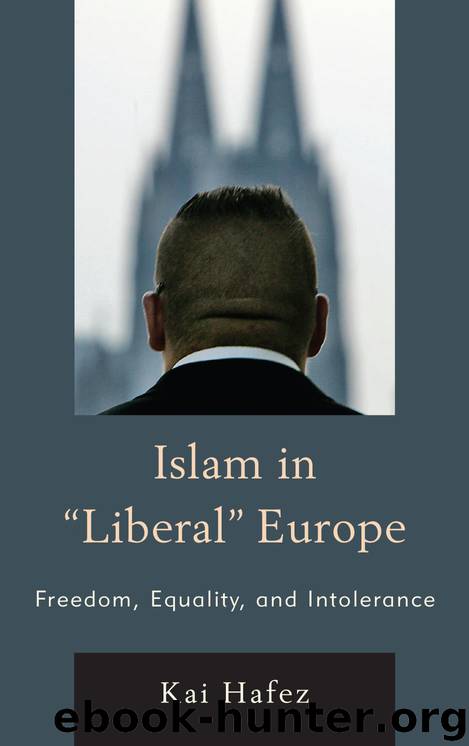Islam in Liberal Europe by Hafez Kai

Author:Hafez, Kai
Language: eng
Format: epub
Tags: undefined
Publisher: Rowman & Littlefield Publishing Group, Inc.
Published: 2012-04-15T00:00:00+00:00
3. Excursus—The Crisis of the Middle Class: The Social Darwinism of Cultural Difference
Frankfurt-based philosopher Axel Honneth has criticized social theory for its economistic and power-political determinism. For too long, he asserts, moral struggles for recognition have been relegated to the margins. At the same time, he concedes that whenever economic survival itself has been at stake, questions of recognition have become secondary (Honneth 1994, p. 264 ff.). According to Honneth, because of this the recognition theory model must not gloss over the struggle for resources and the utilitarian dimensions of society—it should instead provide complementary insights. When all is said and done, is there a socioeconomic logic underpinning the strained relations between European majority society and the Muslim minority? Is Islamophobia part of the calculus of a (neo-)liberal economic system that uses anti-Muslim sentiment to camouflage social Darwinist interests? As we will see, this thesis is overly economistic, though economic factors are undoubtedly influential.
One problem that emerges in this context is that since the Second World War political liberalism in Europe has been associated with small, prosperous milieus of the middle and upper classes. It is a striking fact that right up to the present the German Free Democratic Party (Freie Demokratische Partei or FDP) has taken its lead from classical liberalism but rejects multicultural liberalism as a form of “collectivism,” very much in line with the views of Amartya Sen. As a result, when it comes to party politics, multiculturalism has developed mainly within the Green party (Die Grünen). The Green party has moved ever further away from its left-wing origins and is in competition with the FDP for influence in the bourgeois middle ground of politics. The neoliberal FDP tends to have the conservative section of the bourgeoisie in its sights, and therefore takes a nationalistic and integrationist approach. The Greens, meanwhile, who are increasingly capitalism-friendly, seek a compromise between integration and recognition—thus defining the essence of a new bourgeois liberalism (ch. 1.3).
It is a common misunderstanding that liberalism focuses on the legal and political dimensions but is indifferent to problems of social justice. Influential pioneers of modern liberalism such as John Rawls have made it clear that the achievement of equality of opportunity is a project that a free society can agree on, within the framework of social contracts, in order to avoid unfair—because they are unearned—status advantages and the associated lack of freedom (ch. 1.2). Furthermore, Rawls reminds us that unequal pay in a society is tied to the overall social utility of an activity. It seems almost paradoxical that at an early stage a prominent liberal such as Ralf Dahrendorf, whose career has taken him from the FDP to leadership of the London School of Economics, expressed support for an idea now considered “left-wing,” namely a guaranteed minimum income. According to Dahrendorf, alongside a minimum of equality before the law, the liberal idea includes the “establishment of certain social rights of citizenship” (Dahrendorf 1987, p. 111). For him, the new society of citizens that emerged
Download
This site does not store any files on its server. We only index and link to content provided by other sites. Please contact the content providers to delete copyright contents if any and email us, we'll remove relevant links or contents immediately.
| Anthropology | Archaeology |
| Philosophy | Politics & Government |
| Social Sciences | Sociology |
| Women's Studies |
The Secret History by Donna Tartt(19023)
The Social Justice Warrior Handbook by Lisa De Pasquale(12182)
Thirteen Reasons Why by Jay Asher(8881)
This Is How You Lose Her by Junot Diaz(6868)
Weapons of Math Destruction by Cathy O'Neil(6260)
Zero to One by Peter Thiel(5779)
Beartown by Fredrik Backman(5729)
The Myth of the Strong Leader by Archie Brown(5491)
The Fire Next Time by James Baldwin(5421)
How Democracies Die by Steven Levitsky & Daniel Ziblatt(5208)
Promise Me, Dad by Joe Biden(5139)
Stone's Rules by Roger Stone(5076)
A Higher Loyalty: Truth, Lies, and Leadership by James Comey(4945)
100 Deadly Skills by Clint Emerson(4910)
Rise and Kill First by Ronen Bergman(4771)
Secrecy World by Jake Bernstein(4736)
The David Icke Guide to the Global Conspiracy (and how to end it) by David Icke(4695)
The Farm by Tom Rob Smith(4499)
The Doomsday Machine by Daniel Ellsberg(4480)
